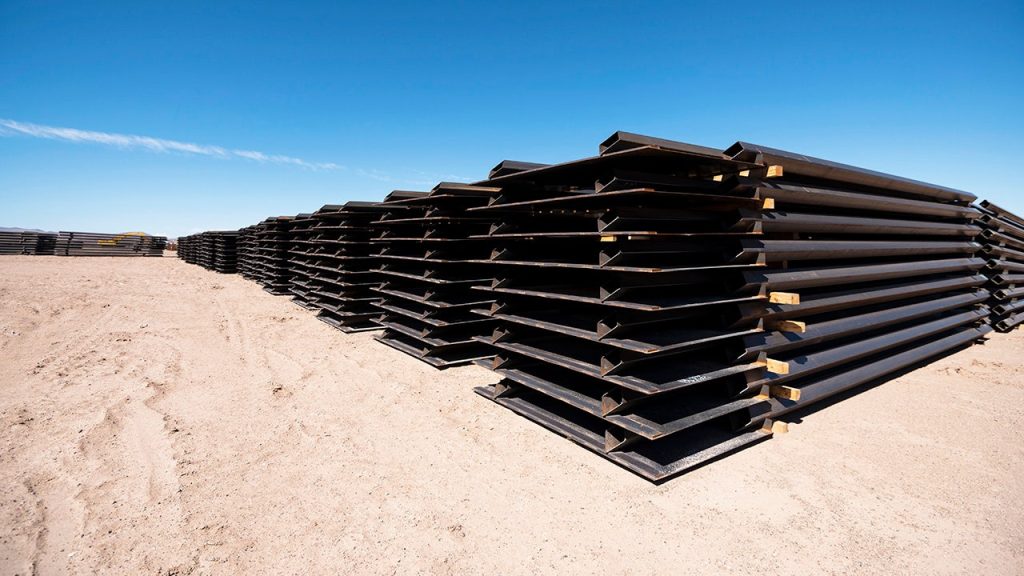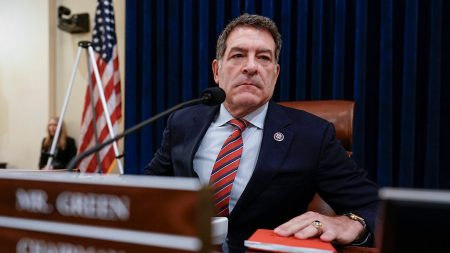Former President Donald Trump, during a press conference held at his Mar-a-Lago resort, launched a scathing attack on the Biden administration’s handling of border wall materials, characterizing their actions as driven by either malice or incompetence. The central point of contention revolves around the Biden administration’s decision to auction off surplus border wall materials, a move initiated in 2023 following the abrupt halt to most border wall construction in 2021. Trump alleges that these materials were sold at a fraction of their original cost – “five cents on the dollar” – and subsequently offered back to his incoming administration at a significantly inflated price. This perceived attempt to profit from the situation drew sharp criticism from Trump, who accused the private company involved of exploiting the government’s decision. He framed the situation as a blatant attempt to capitalize on the administration’s actions, suggesting a deliberate scheme to purchase the materials cheaply and then resell them at exorbitant rates.
Trump’s narrative paints a picture of a calculated maneuver by the private sector to take advantage of the government’s disposal of border wall assets. He claims the company, after acquiring the materials at a deep discount, contacted his administration offering to sell them back at double the initial purchase price – “200 cents on the dollar.” This alleged profiteering incensed Trump, who questioned the logic of removing and reselling materials that were already in place and functioning as intended. He argued that the most efficient and cost-effective solution would have been to simply leave the existing wall sections untouched. The implication is that the entire process of selling and repurchasing the materials was unnecessary and wasteful, costing taxpayers significantly. This episode, in Trump’s view, exemplifies the Biden administration’s mismanagement of public funds and resources.
The situation took a turn when Texas Attorney General Ken Paxton filed a lawsuit against the Biden administration over the border wall sales. This legal action resulted in a court order halting further sales of the materials, a development Trump hailed as a victory. He attributes the intervention of a “very smart judge” for putting a stop to what he considered a detrimental practice. This legal victory underscored Trump’s argument that the sales were ill-advised and potentially harmful to national interests. The court order, in effect, validated his concerns and provided a legal basis for halting the practice. It also reinforced his narrative of the Biden administration acting against the best interests of the country.
Trump’s criticism extended beyond the financial implications of the border wall sales. He also questioned the quality and specifications of the materials being sold. He emphasized that the materials were “top of the line,” consisting of steel, concrete, and rebar, designed specifically for border security purposes by the Border Patrol. The implication being that these were not simply surplus materials, but essential components of a critical national security infrastructure. The sale of these high-quality materials at a significant loss, in Trump’s view, further compounded the mismanagement of the situation. This reinforces his claim that the Biden administration’s actions were not merely financially irresponsible, but also potentially compromised national security.
The former president went on to condemn the entire episode as emblematic of the Biden administration’s broader approach to governance. He reiterated his accusation that the administration’s actions are indicative of either a deep-seated animosity towards the country or a profound lack of competence. This stark dichotomy – either “they hate our country or they’re stupid” – underscores the severity of Trump’s condemnation. He argues that selling vital national security assets at a steep discount, only to potentially repurchase them at a much higher price, demonstrates a level of incompetence or malice that is unacceptable. This incident, in his view, is not an isolated event but rather a reflection of a broader pattern of flawed decision-making.
The border wall saga, in Trump’s narrative, becomes a microcosm of the Biden administration’s perceived failings. The alleged attempt to resell the wall materials at an inflated price, after selling them for a fraction of their cost, is presented as a prime example of the administration’s incompetence and mismanagement. Trump emphasizes the financial losses incurred by taxpayers, highlighting the disparity between the sale price and the potential repurchase price. He uses this discrepancy to illustrate what he considers a pattern of irresponsible spending and poor decision-making by the current administration. This narrative serves to bolster his critique of the Biden administration and to position himself as a more fiscally responsible and effective leader.










